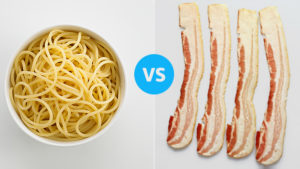It is debated what is more effective for weight loss: low fat diets low carbohydrate diets. When a large scale study from Tulane University suggested that low carbs are the way to go, many people started to trash extra carbs from their diet. However, the results were debated themselves.

There was another study designed for assessing short-term impact of a low fat and a low carb diet. A research from the National Institutes of Health found out that low fat diets are actually more effective than low carbohydrate diets.
So, with this confusion, what should we believe in?
The scientific truth of fat and carb
The meat of the story is burning fat. It is generally believed and proven that when on a low carb diet, you burn more fats. However, as compared to a same duration low fat diet – they take in more food than the other. This is the reason that the principle fails. In a way, you can say that low fat diets make your body fat dissipate faster with full throttle.
Research of fat and carb
So what about the study that promises low carb diets are actually more effective?
The problem lies in the calculation. Here are a couple of details:
- The low fat group was asked to keep fat intake lower than 30% of daily calories.
- The low carb group was asked to keep carb intake lower than 40 g of daily calories.
When compared, “less than 40 grams of carbohydrates” translated into very low carbs, as noted by the Muscle and Fitness magazine. So arguably, when the researches were trying to do a “low fat vs low carb” test they actually did a “low fat vs very low carb” test. It made the test a bit flawed.
So, is low carb the solution?
Low carb diets aren’t a sure shot winner. The bigger study with more diverse composition couldn’t be wrong altogether. However, scientifically you can find that a low fat diet is a faster fat burner than a low carb diet.
The short term study that proved so also underwent some mathematical simulations and arrived on the conclusion that the results will remain the same over long term with minor differences.
The important points
A little test on yourself would reveal the true solution.
- It is still unsafe to assume that one type of diet wins over the other.
- Every person has different eating habits.
- You cannot always stick to mathematical limitations like “less than 30%” or “less than grams”. That’s difficult.
- Fat burning might be different in different metabolism media – bodies, time of day, and so on.
The experiment
So it’s best to run a little week-long test on yourself to figure it out. Let’s see how that can be done. We won’t get mathematical.
- Because there are no mathematical limits, remember that the upper line is satiety. That is, you should eat as less as possible to feel full.
- For the first week, take a diet composed mainly of low carb foods. Bodybuilding.com has a selection of 40 ultimate low carb foods some of which I’m including here: zucchini, cauliflower, Swiss chard, mushrooms, and celery. Check the original list too.
- For the second week, yeah you guessed it. This diet has to include mostly low fat food. There’s a sample menu for a low fat diet on Health.com that includes titles like oatmeal, bananas, low sodium vegetable soup, ½ tuna salad sandwich, brown rice, blue cheese, etc. Check the original list for a more comprehensive coverage.
After this, you would be certain about which one works for you. And that’s it! With a personalized two-week experiment for yourself you’ve solved the mystery. The results might not be the same for everyone and that’s exactly why I don’t recommend going with any of the conflicting studies until we have a more complete one.
Related Post: Top 5 best waist trainer 2019